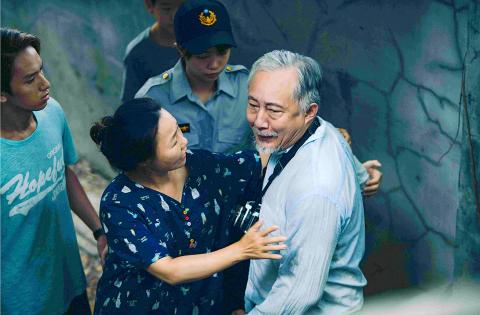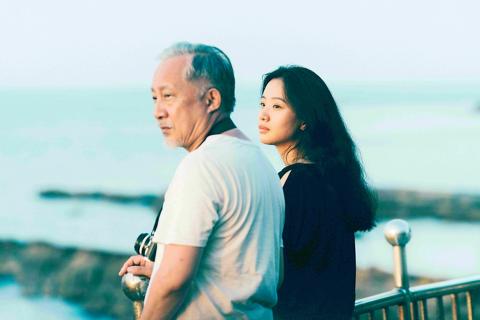It seems like director Chang Tso-chi (張作驥) has a lot he wants to say in Synapses (那個我最親愛的陌生人), which opened for this year’s Golden Horse Film Festival. A lot has happened to him in the past few years — he was convicted of sexual assault and sent to prison in 2015 while his feature Thanatos, Drunk (醉生夢死) won big at that year’s Taipei Film Awards; soon after his release in 2017 his mother developed acute dementia and he cared for her until her death.
Synapses, which earned Chang a nomination for Best Director at Saturday’s Golden Horse Awards, is dark and muddled, and although the underlying theme is clearly dementia and the loss of memories, the plot meanders rather aimlessly. It seems like a lot is going on, but none of it exactly fits together, and there’s not much of a driving narrative as it feels like the film could have ended any time in the second half.
Perhaps this incoherence reflects the existence of Chun-hsiung (Zhang Xiao-xiong, 張曉雄), an elderly veteran suffering from dementia, living with his family in a dilapidated old house in Keelung. He is the film’s weightiest presence, but he’s also not really there due to his deteriorating mind. There is no cure for his condition, and there’s no way to sugarcoat such a story, which adds to the hopelessness of the tone. But the resulting product is rather hard to watch, feeling much longer than its 116-minute running time.

Photo courtesy of atmovies.com
The film is seen mostly through the eyes of Chun-hsiung’s 9-year-old grandson Chuan (Lee Ying-chuan, 李英銓), who tries to make sense of the events that unfold while trying to hatch a turkey egg for his school assignment. He plays the role of the observer that keeps a certain distance from the other characters, but he’s also just as involved because many of the conflicts arise because of him.
Most of the acting is superb, with a masterful performance by Lu Hsueh-feng (呂雪鳳), who plays Feng, Hsiung’s seemingly loving wife of 30 years who devotedly takes care of him. But when Chuan’s mother Xiao Meng (Li Meng, 李夢) comes home after spending six years in jail, things start to unravel and the secrets of this seemingly normal family are revealed.
There’s also Chuan’s good-for-nothing gangster father Wen (Su Chun-chung, 蘇俊忠), Chang’s former military comrade Cheng-en (Liu Cheng-en, 劉承恩) and Turkey Brother (李幼鸚鵡鵪鶉小白文鳥, Alphonse Perroquet/Parrot Caille/Quail Youth-Leigh), a strange homeless man that Chuan hangs out with. All these people’s lives are intertwined in some way and heavily weighed down by the past, but like Hsiung’s mind, they also appear disconnected to each other and to the audience as well. The editing style also reflects this, depicting the story in a patchwork of vignettes.

Photo courtesy of atmovies.com
Adding to this disconnect is the use of languages in the film — Feng mostly speaks in Hoklo (also known as Taiwanese), while Hsiung speaks Cantonese and Mandarin and Meng talks in a Beijing accent. Chuan only speaks Mandarin even though Feng talks to him only in Hoklo. It’s mentioned in one scene that she spent time in Hong Kong, Canada and China, but it’s jarring how differently she speaks from the rest of her family. This device further highlights how fractured this family is, as if they were strangers thrown under one roof.
It’s hard not to compare Synapses to A Sun (陽光普照) by Chung Mong-hong (鍾孟宏), who was chosen for the Golden Horse’s best director over Chang. Both films explore complicated and turbulent family relations, and both plots involve a member who returns home from prison. Dysfunction and despair permeate both films, but by comparison A Sun is much more coherent and focused with a clear message. It was easy to sit through A Sun, but Synapses takes the suffocating tension way further, to the point where the audience needs to frequently break their focus and gasp for air.
If A Sun is about repressed feelings and things unsaid, Synapses is about repressed lives, which is encapsulated in the opening quote, “Without those memories, would his life be better?” It’s bleak, bleak stuff, but sadly, it’s how many Taiwanese of that generation lived, hiding their real selves to live up to the expectations of others. By contrast, Turkey Brother is completely lucid, but he chooses to live the way he does simply for freedom.
It’s is a bold and ambitious attempt in telling a complex saga that spans decades, with great acting, production quality and a subtle yet penetrating jazzy score. But sometimes a movie can get too loaded to enjoy, especially when it’s dealing with such a heavy topic.

This is the year that the demographic crisis will begin to impact people’s lives. This will create pressures on treatment and hiring of foreigners. Regardless of whatever technological breakthroughs happen, the real value will come from digesting and productively applying existing technologies in new and creative ways. INTRODUCING BASIC SERVICES BREAKDOWNS At some point soon, we will begin to witness a breakdown in basic services. Initially, it will be limited and sporadic, but the frequency and newsworthiness of the incidents will only continue to accelerate dramatically in the coming years. Here in central Taiwan, many basic services are severely understaffed, and

Jan. 5 to Jan. 11 Of the more than 3,000km of sugar railway that once criss-crossed central and southern Taiwan, just 16.1km remain in operation today. By the time Dafydd Fell began photographing the network in earnest in 1994, it was already well past its heyday. The system had been significantly cut back, leaving behind abandoned stations, rusting rolling stock and crumbling facilities. This reduction continued during the five years of his documentation, adding urgency to his task. As passenger services had already ceased by then, Fell had to wait for the sugarcane harvest season each year, which typically ran from

It is a soulful folk song, filled with feeling and history: A love-stricken young man tells God about his hopes and dreams of happiness. Generations of Uighurs, the Turkic ethnic minority in China’s Xinjiang region, have played it at parties and weddings. But today, if they download it, play it or share it online, they risk ending up in prison. Besh pede, a popular Uighur folk ballad, is among dozens of Uighur-language songs that have been deemed “problematic” by Xinjiang authorities, according to a recording of a meeting held by police and other local officials in the historic city of Kashgar in

It’s a good thing that 2025 is over. Yes, I fully expect we will look back on the year with nostalgia, once we have experienced this year and 2027. Traditionally at New Years much discourse is devoted to discussing what happened the previous year. Let’s have a look at what didn’t happen. Many bad things did not happen. The People’s Republic of China (PRC) did not attack Taiwan. We didn’t have a massive, destructive earthquake or drought. We didn’t have a major human pandemic. No widespread unemployment or other destructive social events. Nothing serious was done about Taiwan’s swelling birth rate catastrophe.